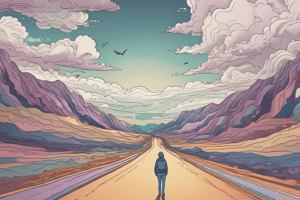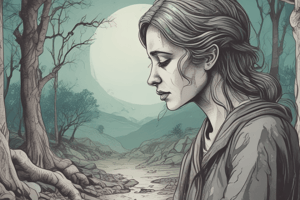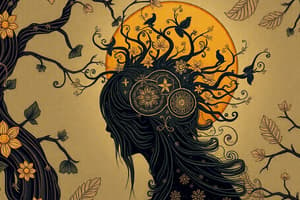Podcast
Questions and Answers
What is a common trigger for mania in individuals with bipolar disorder?
What is a common trigger for mania in individuals with bipolar disorder?
Drugs/alcohol
What is the increased likelihood of developing bipolar disorder when a parent or sibling has the disorder?
What is the increased likelihood of developing bipolar disorder when a parent or sibling has the disorder?
6 times more likely
What is the purpose of mood stabilizing medications in the treatment of bipolar disorder?
What is the purpose of mood stabilizing medications in the treatment of bipolar disorder?
To stabilize mood
What is the name of the therapy that involves electrical stimulation of the brain to treat bipolar disorder?
What is the name of the therapy that involves electrical stimulation of the brain to treat bipolar disorder?
What is the primary goal of psychotherapy in the treatment of bipolar disorder?
What is the primary goal of psychotherapy in the treatment of bipolar disorder?
What is the difference between bipolar disorder and depression?
What is the difference between bipolar disorder and depression?
What is the role of genetics in the development of bipolar disorder?
What is the role of genetics in the development of bipolar disorder?
What is the name of the medication commonly used to treat depression?
What is the name of the medication commonly used to treat depression?
What is the purpose of atypical antipsychotic medications in the treatment of bipolar disorder?
What is the purpose of atypical antipsychotic medications in the treatment of bipolar disorder?
What is the name of the organization that provides information on mental health conditions, including bipolar disorder?
What is the name of the organization that provides information on mental health conditions, including bipolar disorder?
Flashcards are hidden until you start studying
Study Notes
Mood Disorders
- A psychological disorder characterized by the elevation or lowering of a person's mood, affecting their everyday emotional state.
- Nearly one in ten people aged 18 and older have or have had a mood disorder.
- Three main types of mood disorders: depressive disorders, bipolar disorders, and other mood disorders (substance-induced or due to general medical conditions).
Depressive Disorders
- Characterized by persistent feelings of sadness, hopelessness, and anxiety.
- Symptoms include:
- Depressed mood most of the day, nearly every day.
- Significant weight loss or weight gain, or decrease/increase in appetite.
- Insomnia or hypersomnia.
- Psychomotor agitation or retardation.
- Fatigue.
- Feelings of worthlessness or excessive or inappropriate guilt.
- Diminished ability to think or concentrate, or indecisiveness.
- Recurrent thoughts of death, recurrent suicidal ideation.
Types of Depressive Disorders
- Major depression: severe symptoms.
- Psychotic depression: severe depression with some form of psychosis (hallucinations, delusions, etc.).
- Postpartum depression: women experience overwhelming anxiety/sadness after having a baby.
- Seasonal affective disorder: depression during the winter season, related to lack of natural sunlight.
Bipolar Disorder
- Also known as manic-depressive illness, characterized by alternating periods of depression and mania.
- Symptoms include:
- Inflated self-esteem.
- Decreased need for sleep.
- More talkative than usual or pressure to keep talking.
- Flight of ideas or subjective experience that thoughts are racing.
- Attention easily drawn to unimportant or irrelevant items.
- Increase in goal-directed activity.
- Excessive involvement in pleasurable activities that have a high potential for painful consequences.
Types of Bipolar Disorder
- Bipolar I Disorder: mainly defined by manic or mixed episodes that last at least seven days.
- Bipolar II Disorder: characterized by depressive episodes shifting back and forth with hypomanic episodes.
- Cyclothymic Disorder or Cyclothymia: mild form of bipolar disorder, characterized by episodes of hypomania that shift back and forth with mild depression.
Differences Between Depression and Bipolar Disorder
- Depression: persistent feelings of sadness, hopelessness, and anxiety.
- Bipolar Disorder: alternating periods of depression and mania.
Factors Affecting Depression
- Biological factors: hormonal changes, neurotransmitter imbalance.
- Life cycle factors: women experience higher rates of depression due to hormonal changes, pregnancy, and menstruation.
- Psychosocial factors: stress, relationships, and environment.
Causes of Mood Disorders
- Combination of genetic, biological, environmental, and psychological factors.
- Neurotransmitters out of balance.
- Trauma, loss of a loved one, or stressful situations.
- Substance abuse: triggers mania and depression.
- Anxiety disorders: PTSD, etc.
- Genetics: 6 times more likely to develop if a parent or sibling has the disorder.
Treatment Options
- Mood stabilizing medications: Lithium, Depakote, Topamax, etc.
- Atypical antipsychotic medications: Zyprexa, Seroquel, Risperdal, etc.
- Antidepressant medications: Prozac, Paxil, etc.
- Psychotherapy: "talking it out".
- ETC (Electroconvulsive Therapy).
Studying That Suits You
Use AI to generate personalized quizzes and flashcards to suit your learning preferences.




